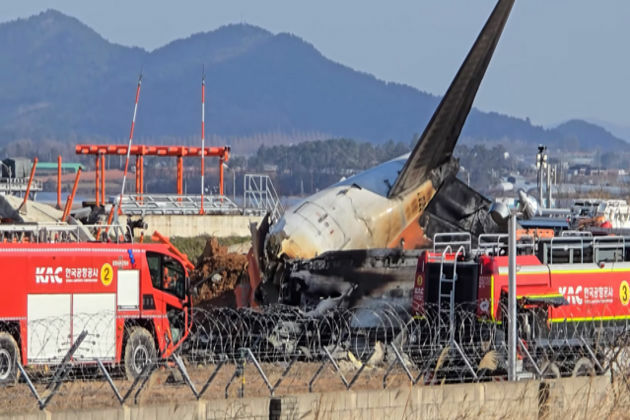Move FM Global News

Pilots may have shut down wrong engine in Jeju Air Crash, probe shows
Jul 24, 2025SEOUL, South Korea: South Korean investigators probing the deadly Jeju Air crash in December have uncovered what they describe as “clear evidence” that the flight crew may have mistakenly shut down the aircraft’s functioning engine following a bird strike.
A source familiar with the ongoing investigation revealed on July 21 that data from cockpit voice recordings, flight computers, and a physical engine switch recovered from the wreckage indicate the crew turned off the left engine—despite more severe damage having occurred to the right engine.
The Boeing 737-800 was en route from Bangkok when it attempted an emergency landing at South Korea’s Muan Airport on December 29. The aircraft crashed into a navigation equipment embankment after overshooting the runway, igniting a fire and causing a partial explosion. Of the 181 people on board, only two survived, making it the deadliest aviation accident on South Korean soil.
Investigators informed family members of victims over the weekend that the bird strike damaged the right engine more severely. However, preliminary findings suggest the left engine, which sustained less damage, was shut down during the emergency response. This misstep may have played a crucial role in the crash.
A government source confirmed that no mechanical faults were found in either engine prior to the bird strike and crash. The preliminary report released in January mentioned that duck remains were found in both engines but did not specify the extent of damage to each. A scheduled media briefing to release further updates was canceled after relatives of the victims raised objections.
Lawyers representing the victims’ families said the unpublished report appeared to place undue blame on the pilots without thoroughly investigating other contributing factors. “All facts surrounding the incident must be clarified,” a spokesperson for a group representing the bereaved families stated.
Jeju Air, the airline operating the ill-fated flight, said it continues to fully cooperate with the probe led by South Korea’s Aviation and Railway Accident Investigation Board (ARAIB). The board has not yet issued an official comment or detailed report on the latest findings. Under international aviation protocols, a final report is typically released within a year of the accident.
Boeing, the aircraft manufacturer, referred all inquiries to ARAIB. CFM International, which produced the aircraft’s engines in a joint venture between GE and France’s Safran, also declined to comment.
Tensions surrounding the investigation have grown. The Jeju Air pilots’ union accused ARAIB of “misleading the public” by implying that the left engine was unaffected, despite both engines showing signs of bird strike. The union further criticized the investigation for failing to establish clear scientific or technical grounds to support the notion that the aircraft could have landed safely using only one engine. It alleged that the investigation was attempting to make scapegoats of the pilots without addressing broader organizational failings.
Experts and family members alike are also questioning the role of airport infrastructure in the disaster. The crash occurred after the plane collided with an embankment containing navigation equipment, a design feature that some aviation specialists argue contributed significantly to the high fatality rate. Both the pilots’ union and victims’ families have called for a thorough investigation into how the embankment may have exacerbated the crash’s consequences.
As the investigation continues, public scrutiny is intensifying—not only over potential pilot error but also over systemic failures and safety shortcomings that may have contributed to the tragedy.


